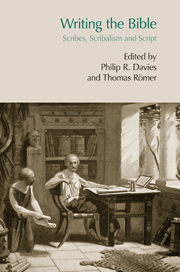Book contents
- Frontmatter
- Contents
- Abbreviations
- 1 Introduction
- I Writing in the ancient world
- 2 Ilimilku of Ugarit: copyist or creator?
- 3 Memory, writing, authority: the place of the scribe in Greek polytheistic practice (sixth to fourth centuries BCE)
- II Hebrew Bible and early Judaism
- III Early Judaism and early Christianity
- Index of biblical and other ancient sources
- Author index
3 - Memory, writing, authority: the place of the scribe in Greek polytheistic practice (sixth to fourth centuries BCE)
- Frontmatter
- Contents
- Abbreviations
- 1 Introduction
- I Writing in the ancient world
- 2 Ilimilku of Ugarit: copyist or creator?
- 3 Memory, writing, authority: the place of the scribe in Greek polytheistic practice (sixth to fourth centuries BCE)
- II Hebrew Bible and early Judaism
- III Early Judaism and early Christianity
- Index of biblical and other ancient sources
- Author index
Summary
According to Detienne (1992: 64), many Greek cities briefly experienced the “temptation of the scribe” at the end of the archaic period (sixth century BCE) when writing was fast acquiring new functions. The public recording of laws guaranteed isonomia and the smooth application of a shared sovereignty at the centre (eis meson) of the public space (Vernant 1962: 40; Detienne 1965; Ruzé 1992). The ban imposed on every scribe from serving twice as clerk for the same magistrature (Lysias, Speeches 30:29; see Lamb 1930) in fourth-century BCE Athens reveals a rising mistrust for scribes despite their being relegated to the status of mere secretaries (grammateus). Such distrust contrasts with attitudes towards writing and its specialists in the Levant and the biblical worlds.
Against the popularity of orality during the 1960s (Havelock 1963), Detienne (1992) underlined the importance of writing in the transmission of knowledge, and the formation of social space in archaic and classical Greece (Svenbro 1988; Thomas 1989). Refusing to consider writing as a global phenomenon and focusing on specific practices, Detienne (1992) has shown that writing did not confer upon Greek scribes the same authority and status as it did to oriental and biblical scribes.
This chapter analyses the place and function of scribes within Greek polytheism. It is only for the sake of comparison with biblical documents that investigation is limited to the religious sphere, since the influence of the gods in fact pervaded all social practices (Vernant 1981; Parker 2005: 387–451), which did not prevent humans from taking autonomous decisions (Detienne 1989: 85–98).
- Type
- Chapter
- Information
- Writing the BibleScribes, Scribalism and Script, pp. 23 - 34Publisher: Acumen PublishingPrint publication year: 2013

